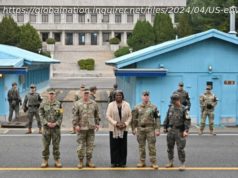Park Geun-hye’s name is still on the lips of candidates, who use her as a rallying cry for change or insist the bribery and other charges against her are false.
SEOUL, South Korea — Just a few months ago, Park Geun-hye was the president of South Korea. Now she is Inmate No. 503.
The daughter of a president who spent her youth in the presidential residence, Ms. Park ascended to the presidency herself four years ago. She now lives in a 114-square-foot jail cell as she awaits her trial on corruption charges.
Ms. Park, whose privileged upbringing and fastidiousness earned her the nickname Princess, once had the city of Incheon install a new toilet for her use during a presidential visit, according to the city’s former mayor. Now she eats $1.30 meals (paid for by the government) , washes her own tray and sleeps on a mattress on the floor.
She can watch the television in her cell for up to six and a half hours a day. Its only channel plays programs approved by the government, including news, documentaries and soap operas, the plots of which could hardly be as unlikely as Ms. Park’s tumble from power.
In December, lawmakers voted to impeach her, and she was formally removed from office on March 10.
Ms. Park has been living in the Seoul Detention Center since she was arrested on March 31. The charges against her include bribery, extortion and abuse of power.
But as the country prepares to vote on Tuesday to elect her successor, Ms. Park, 65, is not forgotten; her name still stirs raw emotions among both her critics and supporters.
Many South Korean liberals and progressives view the election as another opportunity to discredit her and punish her conservative allies. Moon Jae-in, a progressive opposition leader and a political nemesis of Ms. Park, is favored to win the election, according to recent surveys.
But many conservatives still consider her to be innocent.
Since she arrived at the jail in Uiwang, south of Seoul, a small group of die-hard supporters has been rallying in front of it every day. Police barricades and roadside trees were plastered with banners and slogans calling for her release.
“Dear President Park Geun-hye, we love you, ” one read. “Please hang in there. We stand by you.”
Cho Won-jin, a minor conservative presidential candidate, began his campaign last month by kneeling in front of the jail house and bowing in Ms. Park’s direction.
Hong Joon-pyo, a conservative who is currently second or third in the polls, said that if elected, he would pardon her.
Mr. Hong roiled the campaign recently by saying that Ms. Park had fallen gravely ill, while Mr. Cho claimed that she was on a hunger strike.
“They should send her to the hospital, ” Mr. Hong said. “But they don’ t because they are afraid to displease Moon Jae-in.”
The claim went viral, forcing the government to deny that Mr. Park was on a hunger strike or ill. Her lawyers also denied the rumor.
Je Youn-kyung, a spokeswoman for Mr. Moon, said Mr. Hong was spreading “fake news” to woo conservative voters sympathetic toward Ms. Park.
Ms. Park’s trip from the presidential Blue House to the jail house is the most sensational political downfall South Koreans have seen in decades.
Ms. Park grew up in the Blue House; her father, Park Chung-hee, ruled South Korea from 1961 until his assassination in 1979.
She returned there in 2013 as president. She was impeached after four years. Now out of office, she is accused of collecting or demanding $52 million in bribes from big businesses in collusion with a longtime confidante named Choi Soon-sil.
Ms. Park has always stood apart.
She has never married and has no children. She has been estranged from her sister and brother for years. As president, she was accused of keeping her official presidential aides at arm’s length but allowing inappropriate access to a group of secretive friends including Ms. Choi, who helped undo her presidency with activities that prompted accusations of influence-peddling.
But her days in jail may be her loneliest time.
The Korea Correctional Service, a government agency in charge of running prisons around the country, keeps a tight lid on information about Ms. Park’s incarceration. It is known that her cell is separated from the rest of the jail by a partition. She has allowed only three visitors: her two lawyers and a former aide.
The jail authorities said Ms. Park’s solitary cell was bigger than other cells, where several inmates live together. Other inmates are not allowed to approach her. She is allowed to meet her lawyers in a separate room and is said to spend most of her time with them preparing for her trial, which begins on May 23.
She is allowed to exercise for an hour a day, alone and surrounded by tall walls topped with barbed wire. The jail’s first roll call is at 6: 30 a.m., and the lights go off at 9 p.m.
After her father’s assassination, Ms. Park retired from public view, but two decades later she entered politics with a vow to “save the country, ” which was struggling to overcome the devastation of the Asian financial crisis.
During her presidential campaign she told South Koreans, “You, the people, are my only family, and to make you happy is the reason I do politics.”
If she is convicted of bribery and other charges in the coming trial, she could spend from 10 years to the rest of her life in prison.






![Jakie sklepy są otwarte 1 MAJA? Żabka, Stokrotka, Carrefour [GODZINY OTWARCIA]](http://nhub.news/wp-content/uploads/2024/05/thumb883d9b16981d1adde9c4a9c6dedcfbf2-100x75.jpeg)